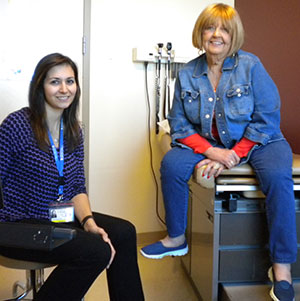Treating the Mind and Body
Federal Money Supports Behavioral Health Care
By Tonia Twichell
 (December 2015) Nearly one in five Americans suffer from a mental illness each year, and one in 12 has a substance abuse problem, according to U.S. Substance Abuse and Mental Health Services Administration.
(December 2015) Nearly one in five Americans suffer from a mental illness each year, and one in 12 has a substance abuse problem, according to U.S. Substance Abuse and Mental Health Services Administration.
But when these patients visit a primary care doctor, half will not be diagnosed with the condition; if they are, most will not pursue recommended mental-health treatment, according to Colorado State Innovation Model.
For the past three decades, studies have shown that coordinating patients’ behavioral and physical health care pays off by catching problems early and avoiding costly crisis intervention later, resulting in lower overall health care costs, healthier communities and happier patients and doctors.
But converting that information into widespread practice in Colorado has proved to be elusive. Until now.
Colorado
The largest, a federal Centers for Medicare and Medicaid Innovation (CMMI) $65 million
The second grant, from the Agency for Healthcare Research and Quality (AHRQ), was awarded to CU in June and will reach 260 small, independent practices in Colorado and New Mexico. The $14.8 million Evidence NOW Southwest grant will be used for quality-improvement services to reduce cardiovascular risk factors.
A third project, the Transforming Clinical Practice Initiative awarded by the CMMI in late September, will provide $11.7 million to support 2,000 Colorado primary care and specialty clinicians in redesigning their care to prepare for emerging payment models.
Health Care Extension Service
The grants allow CU faculty and staff to provide training, expertise, research data and access to resources for health care providers and communities. The Colorado Health Extension System is a broad collaborative supporting
“We’ll assess where the practice is, see how much work they’ve done in terms of implementation and present different options that can move them along the continuum so they can move into the changes that are coming,” Perry Dickinson, MD, professor of family medicine, says. He is project director for the practice transformation aspects of the CMMI-sponsored projects and primary investigator for the AHRQ grant.
Implementing team-based care will be a priority, he says.
“Practices can deliver better and more comprehensive care by expanding the team with folks like behavioral health specialists and care managers,” Dickinson says.
Behavioral integration has been happening on its own for several years with some practices already adopting team-based approaches for disease management and behavioral health care. CU will also encourage specialty practices and mental health centers to work with primary care providers to help coordinate all patient care.
“Comprehensive care is not about your mind. It’s not about your body. It’s about you,” says Ben Miller, PsyD, a national expert on health care integration, clinical psychologist, and director of the Eugene S. Farley Jr. Health Policy Center in the CU Department of Family Medicine. “How can I give you comprehensive care in the setting that you go to most often to receive your care.”
The Payment Conundrum
A broad array of Colorado private and public insurance carriers have signed on in principle, if not in detail, to an integrated health concept, says Colorado State Innovation Model Director Vatsala Pathy, MPA.
Currently, doctors get paid for face-to-face visits with patients, Dickinson says. Payment for behavioral health services, care coordination and types of care outside clinic visits is mostly lacking.
“Everyone has agreed that something has to change,” says Mark Gritz,
“Timing is what makes it so challenging right now—getting providers to sign on to transform before the payers make any type of decision. It’s one of those cases where all pieces have to fall into place. But we cannot wait for the perfect situation.”
Gritz believes the shift can happen before changes in the payment model because most providers want what’s best for their patients.
“As long as what happens is for the well-being of the patient, and it is financially sustainable for them, I think they’re happy to do that,” Gritz says. “The tension comes in when you ask them to do what would improve the quality of care but those changes don’t allow for a viable practice.”
Despite challenges, integrated health will succeed in Colorado, Gritz predicts. “We have enough of a foundation in this state that if it’s going to work anywhere, here’s one place where it has a fighting chance.”
Miller agrees, saying a cultural shift has already occurred.
“It used to be, years ago, that we had to stand on stages and talk about why it mattered to integrate,” Miller says. “We don’t do that anymore. People get it. They know the data. Now it’s about implementation.”
Pathy has noticed the same change.
“One of the things about behavioral health is that it touches all of us in some way,” she says. “Whenever I go out and speak, every person is affected—either it’s a loved one or a friend who has struggled with substance abuse or mental health issues. It’s so commonplace. All of us know how difficult it is to get the services we need when we need them.”